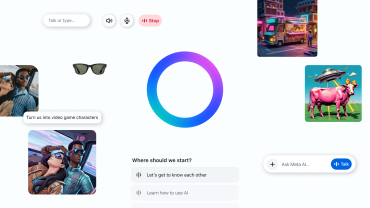
Meta Commits $72 Billion for AI Infrastructure Expansion by 2025
6 minute read

Meta’s historic AI infrastructure expansion mobilizes 2 million GPUs to accelerate superintelligence development across social platforms
Key Takeaways
- Meta commits $64-72 billion in AI infrastructure spending for 2025, deploying over 2 million GPUs by fiscal year 2026 to compete with Google and other tech giants in the AI race.
- $14.3 billion Scale AI acquisition completed, with Meta securing a 49% stake and hiring CEO Alexandr Wang to lead its new superintelligence team after failed attempts to acquire other AI startups.
- Signing bonuses reach $100 million as Meta and OpenAI engage in unprecedented talent wars, with Meta CEO Mark Zuckerberg personally recruiting top AI researchers from rivals including Google’s DeepMind.
Introduction
The artificial intelligence arms race reaches unprecedented intensity as Meta commits up to $72 billion in capital expenditures for 2025, marking one of the largest AI infrastructure investments in corporate history. This massive spending surge positions Meta to deploy over 2 million GPUs by fiscal year 2026 as the company accelerates its push to build superintelligence capabilities.
The investment comes alongside Google’s deeper integration of generative AI into Google Assistant, creating more natural and context-aware user interactions. Both tech giants are racing to dominate the AI landscape through different strategic approaches—Meta betting on open-source development and infrastructure scale, while Google focuses on seamless consumer application integration.
Key Developments
Meta’s AI strategy centers on its Llama platform, with the company planning to release Llama 4 large language model alongside six new AI-powered wearables in 2025. The company promotes Llama as an open-source alternative to competitors’ closed ecosystems, offering developers greater flexibility through the newly introduced Llama API.
Google advances its AI integration by embedding generative capabilities directly into Google Assistant, enabling the platform to handle complex tasks and provide personalized suggestions. According to Yahoo Finance, the integration allows more natural responses while maintaining privacy and security priorities as features roll out over coming months.
Meta’s acquisition strategy proved challenging, with most targeted AI startups including Perplexity AI, Runway, and Safe Superintelligence declining offers. The company succeeded with Scale AI, investing $14.3 billion for a 49% stake while hiring CEO Alexandr Wang to lead superintelligence efforts.
Market Impact
Meta’s Reality Labs division reports $4.2 billion in quarterly losses, highlighting the company’s reliance on core advertising revenue to fund AI investments. Investors monitor these expenditures closely as Meta balances short-term costs against long-term growth expectations from AI-enhanced advertising platforms.
The talent acquisition war drives unprecedented compensation packages, with signing bonuses reaching $100 million as companies compete for top AI researchers. This creates significant cost pressures across the industry while accelerating brain drain from established AI research institutions.
Meta’s aggressive spending signals confidence in AI’s revenue potential, particularly through enhanced content recommendations on Instagram and conversational assistants in WhatsApp. The company explores AI agents for customer service and commerce applications across its platform ecosystem.
Strategic Insights
The contrasting approaches reveal different competitive philosophies in AI development. Meta’s open-source strategy with Llama aims to build developer ecosystems and reduce barriers for startups, while Google’s closed integration focuses on seamless user experiences within existing products.
Meta’s infrastructure investments position the company for long-term AI leadership, though Llama 4 faces criticism over context window limitations and multimodal capabilities. Independent benchmarks expose gaps between marketing claims and technical performance, creating execution risks for Meta’s AI ambitions.
The recruitment intensity reflects AI’s strategic importance, with companies viewing top talent as critical competitive advantages. Meta’s willingness to offer nine-figure packages demonstrates how AI capabilities directly correlate with future market positioning and revenue potential.
Expert Opinions and Data
Meta CTO Andrew Bosworth characterizes the talent competition as unprecedented, stating the market “is setting a rate here for a level of talent which is really incredible and kind of unprecedented in my 20-year career as a technology executive.” OpenAI CEO Sam Altman actively counters Meta’s recruitment efforts, highlighting the strategic value both companies place on key personnel.
CEO Mark Zuckerberg personally leads Meta’s superintelligence team formation, reportedly redesigning office spaces to accommodate top engineers near his workspace. This hands-on approach reflects frustration with AI development pace and determination to accelerate progress through direct leadership involvement.
Industry analysts note Meta’s MoE architecture offers efficiency advantages despite technical limitations, while the company’s open-source approach provides strategic differentiation. The Llama ecosystem’s cost-effectiveness for startups creates network effects that could drive long-term adoption over proprietary alternatives.
Conclusion
Meta’s $72 billion AI investment and successful Scale AI acquisition demonstrate the company’s commitment to superintelligence development despite technical challenges with current models. The unprecedented talent war between Meta and competitors like OpenAI reshapes industry compensation structures while accelerating AI innovation timelines.
Both Meta and Google advance AI capabilities through distinct strategic approaches, with Meta betting on infrastructure scale and open-source adoption while Google prioritizes seamless consumer integration. The massive capital commitments and talent investments signal that AI development costs will continue escalating as companies compete for technological leadership in this transformative sector.





